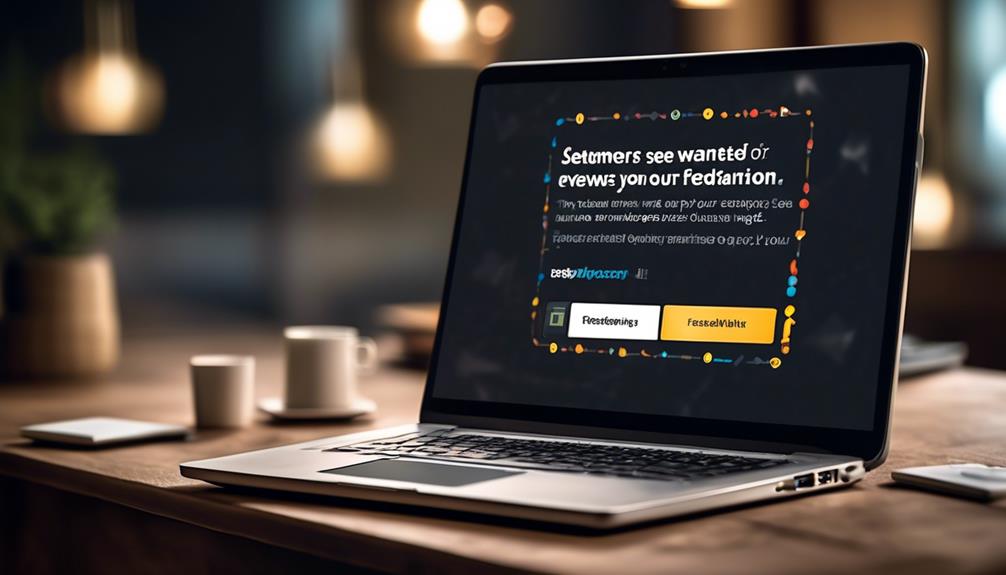Email marketing is a well-known and proven strategy that provides an average return on investment of $42 for every $1 spent.
But did you know that 47% of email recipients open an email based on the subject line alone? That’s a pretty significant number, and it underscores the importance of crafting effective subject lines.
We’ll explore the key elements that make a subject line compelling and how to avoid common pitfalls that can hinder email success.
So, what makes a subject line stand out in a crowded inbox? Let’s dive in and uncover the secrets to creating subject lines that drive engagement and clicks.
Key Takeaways
- Review email subject lines are essential for maximizing customer engagement and response rates.
- Personalization, conciseness, motivational language, and timing are crucial elements of effective subject lines.
- Well-crafted review request subject lines significantly impact the success of email campaigns.
- User-generated reviews provide valuable insights, serve as social proof, and can benefit eCommerce stores.
Importance of Review Email Subject Lines
Understanding the significance of review email subject lines is crucial for maximizing customer engagement and response rates. Email subject lines play a pivotal role in capturing the attention of customers and prompting them to open the email. This is especially important when it comes to review requests.
Crafting amazing review request subject lines is essential for prompting customers to leave reviews and feedback. The best subject lines for review requests are those that are personalized, concise, and polite. They should motivate the recipient to take action while also respecting their time and space.
Additionally, the importance of review email subject lines extends to the overall success of an email marketing campaign. Effective subject lines not only encourage customers to leave reviews but also contribute to increased open rates, click-through rates, and website traffic.
Elements of Effective Subject Lines

Crafting effective subject lines is essential for capturing the attention of customers and prompting them to engage with review request emails. In the realm of eCommerce, where customer experience is paramount, personalized review request subject lines can significantly impact product reviews, online reputation, customer loyalty, and satisfaction.
When constructing request email subject lines, several key elements contribute to their effectiveness. Personalization adds a touch of individuality and relevance, making customers more likely to open the email. Conciseness is crucial, as it ensures that the subject line is clear and digestible at a glance. Motivational language can inspire action, encouraging customers to leave reviews and engage further with the brand. Additionally, timing plays a pivotal role, ensuring that the email is delivered when it’s most likely to be seen and acted upon. Finally, a polite tone can positively influence customer perception and willingness to respond.
As part of a comprehensive Email Marketing strategy, testing different subject lines is imperative to identify what resonates best with diverse audiences and products, ultimately driving higher engagement and success.
Crafting Compelling Review Request Subject Lines
Moving from the focus on the effectiveness of subject lines in the previous subtopic, let’s now direct our attention to the art of creating compelling review request subject lines.
A well-crafted subject line for review request emails can significantly impact the success of your email campaign. When crafting review request subject lines, it’s essential to personalize the message by using the customer’s name and referring to their previous experience with your product. This creates a sense of familiarity and encourages the customer to open the email.
Additionally, incorporating language that conveys the value of their feedback and the impact it can have on the brand can motivate customers to leave a review. Creating a sense of urgency or offering incentives in the review request subject line can also drive higher response rates.
Remember to keep the subject line concise, polite, and aligned with your brand voice. By following these strategies, you can increase the likelihood of customers engaging with your review requests and ultimately leaving a review that can positively impact your business.
Leveraging User-Generated Reviews

Leveraging user-generated reviews allows us to gain valuable insights into our products and services, driving continuous improvement and building trust with our customers. User-generated reviews provide an authentic and unbiased perspective on the customer experience, influencing potential buyers to open and respond to our review request emails. Ecommerce stores can benefit greatly from user-generated reviews, as they can serve as social proof for hesitant customers and those with abandoned carts. By encouraging customers to read reviews and share their own experiences, we can create a positive word-of-mouth effect that enhances the reputation of our product or service.
| Benefits of User-Generated Reviews |
|---|
| Valuable insights into products and services |
| Authentic and unbiased perspective |
| Positive word-of-mouth effect |
Best Practices for Review Request Email Subject Lines
When requesting reviews via email, it’s essential to craft subject lines that captivate recipients and encourage their active engagement with our brand.
To ensure our review request emails are effective, we must make sure to:
- Personalize the Subject Line: Addressing customers by name and creating a warm, familiar tone can significantly increase open rates and prompt engagement.
- Keep it Concise: A good subject line should deliver a clear message within a limited character count, ensuring it fits all devices and email apps.
- Use Motivating Language: Ask for the review in a way that nudges customers to open the email and respond. Incentives, urgency, and engaging language can prompt review responses.
- Time it Right: Sending review request emails when the customer’s experience is still fresh can increase the likelihood of receiving a response.
Frequently Asked Questions
What Is the Subject Line for Asking for a Review Email?
We should use a clear and compelling subject line when asking for a review via email. It should be concise and attention-grabbing, prompting the recipient to open the email and consider providing feedback.
What Is the Subject Line for Feedback Email?
The subject line for a feedback email is crucial for engagement. We should personalize it to create a one-on-one conversation and avoid spammy language. Incorporating a sense of urgency can also boost open rates and prompt immediate action.
What Is a Good Subject Line for a Check in Email?
We’ve found that “Just Checking In: How Are You Doing?” works well. It’s friendly, shows genuine interest, and encourages a response. Personalizing it with the recipient’s name can make it even more effective.
What Are Good Professional Subject Lines for Emails?
We craft professional subject lines to grab attention and encourage action. Our personalized, concise, and polite approach creates a sense of urgency and motivates engagement. Our brand voice resonates, driving increased customer response rates.
Conclusion
In conclusion, review email subject lines are crucial for capturing the attention of readers and driving engagement.
By incorporating elements of effectiveness and crafting compelling subject lines, businesses can leverage user-generated reviews to boost their email success.
Just like a well-crafted subject line is like a bright beacon in a sea of emails, drawing in readers with its irresistible charm.
Remember to follow best practices and watch your review request emails shine like a diamond in the rough.









